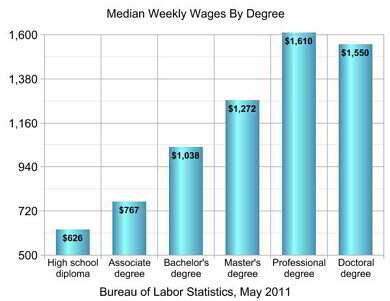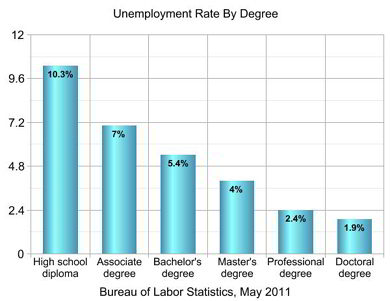Although there are a lot of misconceptions about higher education, the correlation between earning a degree and career earning potential is not one of them. According to the U.S. Bureau of Labor Statistics (BLS), your investment in an advanced degree is likely to pay off. May 2014 data from the BLS shows those with a master’s, professional or doctoral degree earn more median pay on a weekly basis than those with only a bachelor’s degree. The pay difference ranges from $225 to $538.
This high-end difference in earnings occurs when those with a professional degree are compared to those with a bachelor’s degree. Workers with a professional degree, such as a JD for lawyers or MD for doctors, earn median weekly wages of $1,639, compared to the weekly median earnings of $1,101 made by those with a bachelor’s degree, according to the BLS. In addition, the agency reports that the earnings for a professional degree also exceed those made on a weekly basis for those people having a doctoral degree.

Studies also show that those with advanced degrees earn more on a yearly basis — not just weekly — than those with solely a bachelor’s degree. A 2010 study from The College Board indicates that those with a master’s degree earn median after-tax earnings of $51,100 while those with a bachelor’s degree earn median after-tax earnings of $42,700.
BLS data also indicates that those with an advanced education are less likely to find themselves on the unemployment line. Master’s degree graduates have a 2.8 percent unemployment rate, while those with a bachelor’s degree experience 3.5 percent unemployment.

The trend toward advanced education is on the rise as more people compete for jobs and hope to find a competitive edge. In 1999, 27 million people in the U.S. age 25 and older had a bachelor’s degree or higher, while in 2009, that number reached 44 million. If it’s time for you to take steps toward increased earnings, you can make a start by looking at graduate schools. Online opportunities also provide a convenient way to obtain an education while advancing your academic goals.
Graduate Majors Guides
Related Links
- Making the Decision to Get Your College Degree
- What is a College Major, and How Should You Choose One?
- Top Jobs and Career Trends
- Choosing a College Major: Assess Yourself
- Education vs. Work Experience
“Earnings and unemployment rates by educational attainment,” U.S. Bureau of Labor Statistics, Employment Projections, Accessed April 24, 2015, http://www.bls.gov/emp/ep_table_001